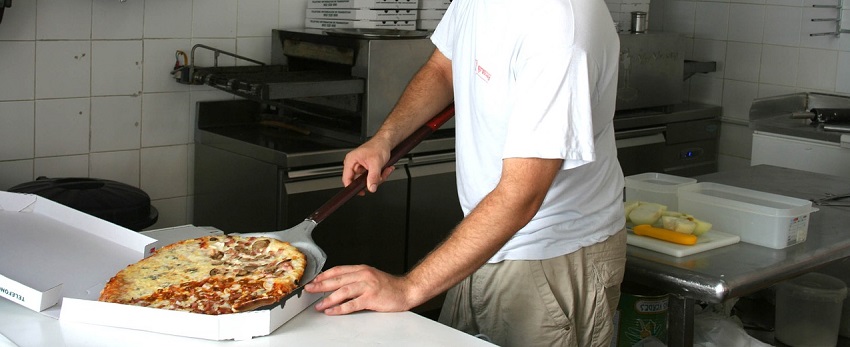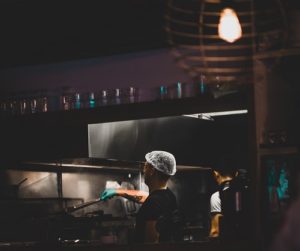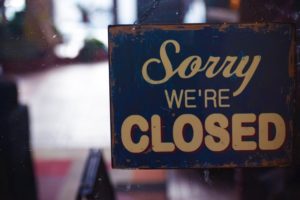
Is the latest development in the fast-food industry a golden opportunity or does its spooky name suggest a darker side which poses a threat to the health of the restaurant business as we know it?
Let’s take a closer look.
Some Background on Food Delivery
Fast food delivery is nothing new: you could order naengmyeon, cold noodle soup, to go in Seoul as early as July 1768, while the first takeaway pizza was delivered to the palace of King Umberto and Queen Margherita in Naples in 1889.
Since those early days of food delivery, it is fair to say that a lot has changed, from shifts in modes of transport (no more horse-drawn carts) to disposable food packaging innovations such as the corrugated cardboard box, which has been keeping our pizzas from steaming themselves soggy since the 1960s.
And the industry is still changing: with the greatest shift in recent years being the leap online. No more of those long-dreaded phone calls to make your order: since the rise of websites such as JustEat, which have connected customers with dinner deliverers for nearly twenty years now, fast food has been at our fingertips. 
And that reality has driven a broadening of the marketplace with one upstart start-up, in particular, driving a trend in recent years: Deliveroo. Founded in 2013 by ex-investment banker Will Shu, Deliveroo set out with an aim to make cooking our own food a thing of the past, by making it possible for people to order high-grade restaurant-level food to their homes.
Building an army of 50,000 Deliveroo riders who currently act as middle-men, delivering dinners door to door, Shu’s enterprise has grown by 101,117% in the last four years alone. Now, Deliveroo dominates the market: though it is still fighting fiercely against its main rival UberEats, Deliveroo has already forced one competitor out of business, none other than the richest man in the world, Jeff Bezos, whose AmazonRestaurants admitted defeat in 2018 after just two years in operation.
With this immense success comes an immense power to shape the food delivery industry as we know it. And Deliveroo is exercising that power.
Enter:
The Emergence of Dark Kitchens
Also known as “cloud” or “ghost” kitchens (names which don’t make them sound any less spooky), dark kitchens are kitchens designed to serve only take-away customers. Detached from the high-street, these kitchens can be located anywhere, within easy reach of new target markets.
Sixteen have been set up by Deliveroo in the form of Deliveroo Editions across the UK: 10 in London, and then one each in Cambridge, Hove, Nottingham, Leeds, Reading and Salford. Together, these 16 sites house about a hundred stainless-steel kitchens.
And each one works in essentially the same way. Staff from various restaurants travel to these sites where they share shelves and utilities with staff from other restaurants. While there, they prepare food solely to be handed over to the delivery drivers waiting outside.
Though they operate in a grey area, not being registered as restaurants or fast-food joints, dark kitchens are still within the jurisdiction of the Food Standards Authority, and so are kept to food safety standards, being awarded a star rating on the Food Hygiene Ratings Scheme.
But while there may be nothing to worry about in terms of food safety, this new disrupting force in the industry does raise a few crucial questions.

What Do They Mean…?
For Customers
For customers, they don’t mean all too much. 90% of the food on Deliveroo still comes from high-street restaurants and the food which doesn’t is marked out with a purple Editions logo on the app. As you’re paying for the food and not the surroundings, and as the food is the same as before, it makes very little difference to you as a customer.
For the Restaurateur
For the restaurateur, however, dark kitchens do change things.
In one sense, dark kitchens are a golden opportunity. Deliveroo makes its money by charging a commission on each meal sold from its kitchens. In return, Deliveroo offers restaurateurs a rent-free, rate-free, utilities-free space in which their staff can prepare and sell meals to a new market: meaning they can test out a new customer base with next to no investment. Dark kitchens possess a lot of money-making potential.
But a sizeable portion of business owners may be wary about making use of that potential. 
There is a reason chef's who work in dark kitchens, such as the chefs at Franco Manca’s Editions kitchen in Blackwall, tend to be paid more than those on the high-street: with many dark kitchens set up in shipping containers on industrial estates — far removed from the restaurant setting and with no interaction with front-of-house staff — they can be lonely and unfulfilling places to work.
Being aware of the situation of Deliveroo’s own drivers who, officially classed as self-employed gig-economy workers, are left unprotected by unions as they are forced to work long hours for low pay, and who bear the brunt of Deliveroo’s attempts to undercut its competitors with loss-making profits, restaurateurs may worry that, by taking the bait and sending their cooks off to dark kitchens, they may end up putting their staff in a similar situation.
_______
As the business practice moves into the mainstream, with the no-less-ruthless UberEats buying 100 dark kitchens across London earlier this year, asking questions about dark kitchens will be ever more important in the years to come. As restaurateurs decide between the profit potential, possible impact on their eat-in business and the possible threat to the welfare of their workers posed by Deliveroo and its dark kitchens, none of those questions may be more important than: Can We Trust Them?


